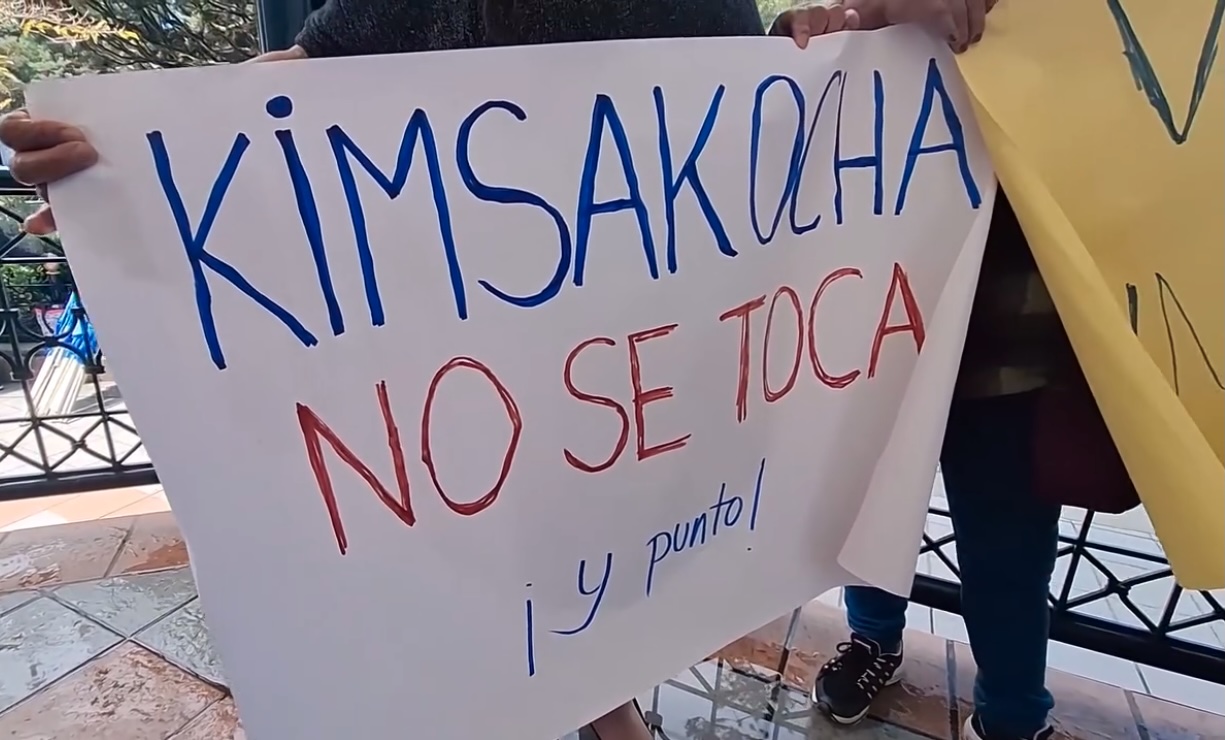On May 19, the Ecuadorian Chamber of Mining reported that a "free, prior and informed consultation process" had been approved for Canadian Dundee Precious Metals’ project. The Chamber says that “100% of the inhabitants of [Indigenous community of San Pedro de Escaleras] approved the advancement of mining operations” calling it a “historic milestone. For the first time in the country, a free and informed prior consultation on mining has been carried out, as stipulated in ILO Convention 169.”
As a response to this announcement, mining-affected communities, including San Pedro de Escaleras community, have said this consultation was carried out with only a select handful of people and it was not necessary, given communities have already voted against mining in three previous popular consultations: Victoria del Portete (2011), Girón (2019), and Cuenca (2021).
In a statement this week (translated below), Cabildo por el agua (Cuenca Water Council), a local urban environmental collective, states that this consultation process was carried out with only a select handful of people and didn’t include the mining-affected communities; there have already been three popular consultations where an overwhelming majority of the population has voted against mining exploitation in the headwaters of key watersheds; and from a legal point of view, this consultation, they argue, couldn’t be carried out, because “there’s no legislation in Ecuador that regulates prior, free and informed consultations” in the country. Groups such as the Cuenca Water Council have been asking the Ecuadorian courts to annul “fraudulent consultation processes, which seek to advance the project by trampling on our rights to water, the environment, and civic participation.”
The Loma Larga project was suspended by a provincial court in August 2023 – a decision ratified by the Constitutional Court in February 2024 – for failing to obtain a social licence from affected Indigenous communities through a process of free and prior consultation with the Indigenous community of San Pedro de Escaleras, and for failing to carry out an environmental consultation.
The government carried out the environmental consultation in October 2024 under the highly controversial Decree 754, without guaranteeing the participation of affected communities, including rural and urban communities. During a press conference in the city of Cuenca in December 2024, Romulo Guzman, President of the Gobierno Autónomo Descentralizado (GAD) of Victoria del Portete, a parish which includes the community of San Pedro de Escaleras, affirmed: “I don't know why they insist on organizing another prior, free, and informed consultation on a matter that has already been settled. We absolutely do not want mining exploitation. What we want is for [the government] to respect the dignity and sovereignty of our ancestral peoples.”
The mining project in question represents a “ticking time bomb” for arsenic contamination and it is owned by Toronto-based Dundee Precious Metals. For more than 30 years, mining-affected communities have organized to oppose mining and protect the páramos, the high-altitude wetlands that play a crucial role providing fresh drinking water for tens of thousands of people in the region.
PUBLIC STATEMENT
There has been no prior consultation
Cuenca, May 19, 2025
In response to information released by some local media outlets stating that mining operations would proceed at the Loma Larga project after the company allegedly complied with the ruling of the Provincial Court of Justice of Azuay and conducted a free, prior and informed consultation with the community of Escaleras, we hereby state the following:
1. Following the popular consultation on Water in Cuenca on February 7, 2021, in which the people voted to prohibit mining in the water recharge areas of the Tarqui, Yanuncay, Tomebamba, Machángara, and Norcay rivers, no administrative action aimed at defrauding the sovereign will of the people will be taken.
2. The Cuenca Water Council denounced the farce of the environmental consultation, which failed to consult tens of thousands of people who use the waters originating in Quimsacocha, blatantly replacing these communities with three groups of farmers numbering less than seventy people linked to the Dundee Precious Metals company.
3. No prior consultation has been held with the community of Escaleras in the parishes of Tarqui and Victoria del Portete, and it cannot be carried out because, in accordance with the ruling of the Constitutional Court, a law regulating prior consultation is necessary to carry out such consultation. However, such law does not yet exist.
4. Nor has Ministry of Environment, Water and Ecological Transition (MAATE) complied with the reports required by the ruling of the Provincial Court of Justice of Azuay, related to the Quimsacocha páramo. On the contrary, the company ETAPA EP, in its “Technical report on the sustainability of water sources originating in Quimsacocha in the context of the exploitation phase of the Loma Larga mining project,” has revealed all the omissions and fallacies of the mining company's Environmental Impact Study, as well as the falsehoods contained in the MAATE's pseudo-report on said Study, demonstrating that this Ministry has acted in collusion and complicity with the transnational mining company.
5. We demand that the major national media outlets, out of respect for the right of citizens to access accurate and verified information, verify the information with other sources.
The Cuenca Water Council demands that the authorities of the Ministry of the Environment and the Ministry of Energy and Mines, as well as judges and courts, act in accordance with the Ecuadorian Constitution. The arbitrariness and corruption in this consultation process cannot be tolerated.
CABILDO POR EL AGUA (CUENCA WATER COUNCIL)
Read original statement in Spanish, attached.

